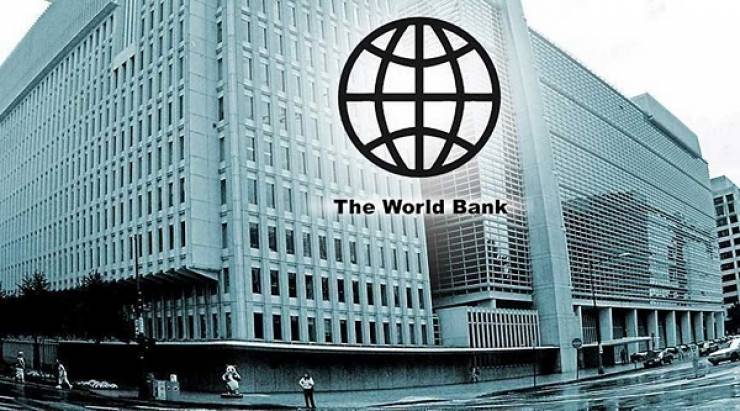
Washington - Saba:
The World Bank said that the Zionist war on the Gaza Strip is pushing the Palestinian territories into an unprecedented crisis.. Estimating that the Palestinian economy lost by a quarter during the current year after another major contraction in 2023, which is "a slowdown unparalleled in recent memory."
According to what was reported by the Palestinian News Agency, a new assessment prepared by the World Bank on the repercussions of the war, issued on Monday, stated: "The ongoing conflict in the Middle East continues to have catastrophic effects on the Palestinian economy, and is pushing the Palestinian territories into an unprecedented crisis.. The war resulted in a staggering number of casualties, large-scale displacement affecting about 1.9 million people, and massive destruction of infrastructure in Gaza."
He added: "The continuation of hostilities has also led to a sharp decline in economic output and the collapse of basic services in both the West Bank and Gaza, amid rising poverty rates across the Palestinian territories."
The World Bank said real GDP in the West Bank shrank by 23 percent and in the Gaza Strip by 86 percent in the first half of 2024, and estimated the economy in the Palestinian territories to shrink by 26 percent for the entire year 2024. “The economic slowdown (in the Palestinian territories) caused by the conflict is unparalleled in recent memory,” he continued. “The impact of the conflict has now surpassed all previous economic crises in the Palestinian territories over the past two decades, including the second intifada in 2000, the internal division in 2006, the Gaza war in 2014, and the shock of the COVID-19 pandemic in 2020.”
The bank noted that all sectors were severely affected, with construction, manufacturing, services, and trade seeing the largest declines. The conflict has also disrupted labor markets, leading to high unemployment rates, especially in Gaza, where more than four out of five people are currently unemployed.
However, the World Bank said that the Palestinian financial sector remains resilient, although the conflict has exacerbated existing challenges.
It added: While the banking sector remains well capitalized, it faces increased risks from credit losses, diminishing profits, and operational challenges, especially in Gaza, where cash shortages have intensified, impacting aid delivery. Remittances, food security, and access to basic services.
He continued: The banking system's exposure to the public sector has also increased, amplifying the underlying risks of the financial sector.
The World Bank said that the Zionist war on the Gaza Strip is pushing the Palestinian territories into an unprecedented crisis.. Estimating that the Palestinian economy lost by a quarter during the current year after another major contraction in 2023, which is "a slowdown unparalleled in recent memory."
According to what was reported by the Palestinian News Agency, a new assessment prepared by the World Bank on the repercussions of the war, issued on Monday, stated: "The ongoing conflict in the Middle East continues to have catastrophic effects on the Palestinian economy, and is pushing the Palestinian territories into an unprecedented crisis.. The war resulted in a staggering number of casualties, large-scale displacement affecting about 1.9 million people, and massive destruction of infrastructure in Gaza."
He added: "The continuation of hostilities has also led to a sharp decline in economic output and the collapse of basic services in both the West Bank and Gaza, amid rising poverty rates across the Palestinian territories."
The World Bank said real GDP in the West Bank shrank by 23 percent and in the Gaza Strip by 86 percent in the first half of 2024, and estimated the economy in the Palestinian territories to shrink by 26 percent for the entire year 2024. “The economic slowdown (in the Palestinian territories) caused by the conflict is unparalleled in recent memory,” he continued. “The impact of the conflict has now surpassed all previous economic crises in the Palestinian territories over the past two decades, including the second intifada in 2000, the internal division in 2006, the Gaza war in 2014, and the shock of the COVID-19 pandemic in 2020.”
The bank noted that all sectors were severely affected, with construction, manufacturing, services, and trade seeing the largest declines. The conflict has also disrupted labor markets, leading to high unemployment rates, especially in Gaza, where more than four out of five people are currently unemployed.
However, the World Bank said that the Palestinian financial sector remains resilient, although the conflict has exacerbated existing challenges.
It added: While the banking sector remains well capitalized, it faces increased risks from credit losses, diminishing profits, and operational challenges, especially in Gaza, where cash shortages have intensified, impacting aid delivery. Remittances, food security, and access to basic services.
He continued: The banking system's exposure to the public sector has also increased, amplifying the underlying risks of the financial sector.